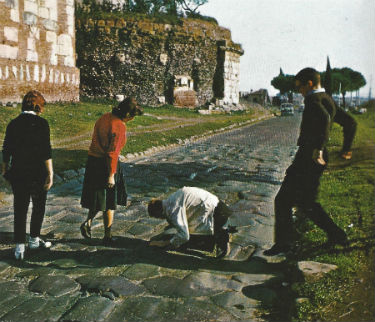St. Paul’s Christmas Message?
By Neil Earle
 The Gospel writers – and even the Queen – all have their Christmas message. So why shouldn’t the Apostle Paul?
The Gospel writers – and even the Queen – all have their Christmas message. So why shouldn’t the Apostle Paul?Tucked away in quiet dignity near the heart of the majestic Book of Romans lies what I like to call Paul’s Christmas Message.
The Gospel writers Matthew and Luke have theirs – sometimes called the Birth or Infancy Narratives. The Queen of England will have hers. No doubt the Prime Minister and the U.S. President will have theirs. So why shouldn’t Paul?
It is sometimes fun to play the “what if” game. For example, what might that contagious Gospel communicator, the apostle Paul, the best missionary the church has ever had, how might he approach the Christmas season if he were here today?
Some of his clear purpose statements such as 1 Corinthians 9:22 show he might have used this season of choirs singing and cash registers ringing as a platform or jumping off spot to explain more of the deeper purposes of God. He’d see the sham, the commercialism, the greed, yes. But Paul was an original thinker. His single-minded, consuming outlook on life caused him to rejoice even if the Gospel were preached out of envy or strife (Philippians 1: 15-16). Yet he might also have noticed that such phrases as “peace on earth” and “glory to God in the highest” ringing in everyone’s ears this time of year. He’d feel, yes, this can “soften” people up to be a little more receptive to the Gospel.
Let’s do a thought experiment. Let’s imagine that the apostle Paul’s pronounced penchant for evangelism, his primary principle that it mattered less how Jesus was preached as long as he was preached, meant he might not mind too much if I introduce Romans 5:12-21 as his Christmas message.
How so?
 Paul spared no effort to preach the God of Peace.
Paul spared no effort to preach the God of Peace.Peace with God
Romans 5:1 sets the context and lends some support for this theory.
Paul opens with: “Therefore, since we have been justified through faith, we have peace with God through our Lord Jesus Christ, through whom we have gained access by faith into this grace in which we now stand. And we rejoice in hope of the glory of God.”
“Peace with God” – marvelous phrase. Isn’t this close to the center of things at Christmas? “Gained access” – that was God’s purpose even in Israel building a magnificent tabernacle in the Wilderness: to have fellowship with Israel. This urgent desire of the Great God was to share everything including his very nature with us (2 Peter 1:4). Paul told the Corinthians that through the miracle of the Holy Spirit Christians are actually joined to Christ (1 Corinthians 6:17). This artfully aligns with the theme of some of the more inviting songs people sing this year. “O Come, all ye faithful,” “Angels we have heard,” and a plaintive favorite, “O Come, O Come, Immanuel.” Immanuel means “God with us.” There are powerful and surging lines such as “Come to Bethlehem and see/ Him whose birth the angels sing.”
The Gospel is our invitation to the Kingdom Christ advanced and proclaimed. These stout old songs say nothing about flying reindeers or stockings hung by the chimney. They rather underscore a great Gospel truth. It was this: Israel in Jesus’ time felt it was still living in bondage, that the nation had really not atoned for the sins that led to the Babylonian Captivity almost 600 years earlier. According to N.T. Wright in The Climax of the Covenant (page 141) their deepest thinkers explained that the oppressive Roman jackboot in Judaea was penalty for their rebellions against God. Now…here comes news of this little baby born in Bethlehem, One foretold by inspiration as the real purpose for Israel’s existence, One who personifies “the tender mercy of our God, by which the rising sun will come to us from heaven to shine in those living in darkness and in the shadow of death, to guide our feet into the path of peace” (Luke 1:78).
Jesus was sowing the Kingdom with his words and deeds until it ultimately triumphs.
 Paul before Herod Agrippa II: What Paul called the Gospel of Peace reached even the high and mighty. Painting by Nikolai Bodarevsky (1850-1921)
Paul before Herod Agrippa II: What Paul called the Gospel of Peace reached even the high and mighty. Painting by Nikolai Bodarevsky (1850-1921)Sharing God’s Glory?
Peace – irene in the Greek – was one of Paul’s favorite words. As we know, it meant more than the absence of war – though that is a comforting enough thought. It means a positive anointing of our hearts and minds with the saving, refreshing, revivifying oil of God’s Holy Spirit, the Spirit of Peace. It means good will towards all the men, women and children we meet all year round.
Paul’s brief overture ends with the hope Christians seize on to eventually participate in the glory of God. Wow! To share in the glory of the Godhead. That’s the Plan. God already call us “heirs of God and joint-heirs with Christ” (Romans 8:17). That’s some theme, eh? This message was broadcast to the rough and rowdy shepherds responding to the angels’ majestic appearance outside Bethlehem. The angelic choir spoke to captive Israel’s need: “Do not be afraid. I bring you good news of great joy that will be for all the people” (Luke 2:10).
How extraordinary was that first Christmas! Rugged, culturally-despised shepherds from the laboring classes given first access to God’s work in Bethlehem that night. “Good news” – that’s the Gospel again. Those hard-bitten laborers “returned, glorifying and praising God for all the things they had heard and seen” (Luke 2:20).
 ROAD TO ROME: Paul passed this way as a Prisoner of Rome.
ROAD TO ROME: Paul passed this way as a Prisoner of Rome.“The Dayspring from on High”
To continue, in Romans 5:10 Paul enunciates how important the life of Christ is to every believer. “For if, when we were God’s enemies, we were reconciled to him through the death of his Son, how much more, having been reconciled, shall we be saved through his life!” Exclamation point indeed. If Paul were here today, Gospel opportunist that he was, he might point out that the One we worship as the Lord Jesus Christ began his life as “the dayspring from on high” (Luke 1:78, NAV) – God’s ray of sunshine, a spark of hope in a dark world. This was part of the mission of the little baby in Bethlehem.
One Christmas carol croons, “man shall live forever more/because of Christmas day.” That might be forcing the theology a little bit (the Cross was always first with Paul) but such kinder, gentler overtures to the Gospel are all around us this time of year. Late December in the Western world offers alert Christians incentive to study, teach, and share – even if over a cup of coffee – more of the Good News of salvation. The fact of the very Light of the world, of this universe “tabernacling” among us (John 1:14), this should help us emulate the switched on apostle Paul. His reflection upon the great purpose God is working out in us burst out in thanksgiving: “We also rejoice in God through our Lord Jesus Christ, through whom we have now received reconciliation” (Romans 5:11).
Access. Peace with God. Reconciliation. Who doesn’t want those this Christmas, perhaps more than ever!